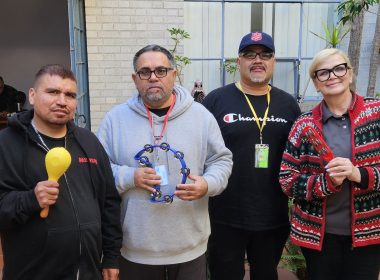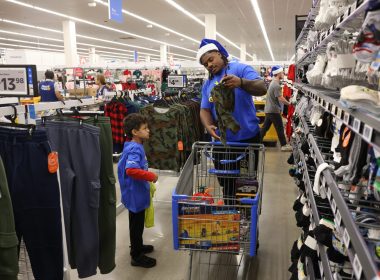Q&A with Kelly Rodriguez, Licensed Marriage and Family Therapist.
Initiating a conversation about drugs and substance abuse can be a scary leap for many parents. The discussion comes with plenty of pressure— and lots of questions.
When do kids need to know this information? And how should parents present it? Where can parents find trusted answers for hard questions?
After all, the stakes are high.
In 2023, 1.78 million kids ages 12-17 met the criteria for Illicit Drug Use Disorder (IDUD), according to the National Center for Drug Abuse Statistics. That same year, one in four children lived with a primary caregiver who had a substance abuse disorder, according to the National Institute of Health.
For guidance, Caring asked Kelly Rodriguez, a Licensed Marriage and Family Therapist.
When should parents start talking to kids about addiction and drug use?
One thing to keep in mind is how exposed they are to drugs. Are there any issues? Is there someone in the home who might be experimenting with drugs or substances? In that case, you want to have a conversation as soon as possible.
If they haven’t been exposed to anybody at home, they may have been exposed at school. It might depend on their age, where they go, what kind of friends they have. They might hear of someone who is experimenting, or a friend may have a sibling who is using. Even if there is no drug exposure at home, they can start to hear things, so it’s important to pay attention because a lot of times, younger and younger kids are being exposed to these ideas.
But if there is no concern about exposure, you can have a more educational, open conversation. You can say, “You know, there are so many things in this world that can sometimes damage our body and our brain,” and give age-appropriate examples.
In that case, start the conversation with school-age kids, ages 6-12. Older kids will most likely bring it up themselves, so, at that age you definitely want to have this conversation because that’s also when they become more aware of their peers and wanting to fit in.
But it is a good idea to start by gauging their awareness. Ask if they know anything. Then, you can assess if you’re starting from scratch.
How would you frame this conversation? You mentioned health; is that where you would begin?
It depends on the situation. If there is someone at home who struggles with substance abuse, then the child is going to know—they’re very perceptive. They will notice things like arguments, people drinking or smoking, whatever the situation is. So the conversation would look a little different and you can be very straightforward.
For example: “Maybe you’ve noticed whoever—daddy, or mommy, or grandma, or cousin, or sibling—can struggle sometimes. Maybe they get into arguments or leave the house for a few days. I’m wondering what you think about what’s happening.”
If they don’t have a situation at home, the conversation can be more about taking care of yourself and making good choices. Because they may not know anything about it, but they are going to encounter someone who will have a conversation, tell a joke or talk about someone struggling at home.
You might say, “Sometimes we can make choices to protect our bodies and keep them healthy, or we can put things in our bodies that put them at risk.”
And you can put it in ways they understand like, “If I only eat sweets, probably my brain is not going to feel great, my body is not going to feel great, my teeth might not be too healthy. Sometimes there are unhealthy things we can put in our bodies that are going to have longer-lasting effects. And sometimes it can feel hard to make the healthy choice if you have people around you who are making an unhealthy choice.”
If they’re just learning about it, I think it’s important to be very straightforward and clear.
This topic can be very heavy. Especially with the ongoing fentanyl crisis, conversations about addiction can lead to conversations about potential overdoses. When or how should parents consider talking about some of these harder things?
I have three kids in very different stages. And I wish I could say we could wait until high school. But the truth is the information is coming to younger kids. So I would say middle school, before they enter middle school, it’s a really good conversation to have.
Keep in mind they might know information they may not be sharing with you. They might be thinking, “Is this wrong? Is it right? I don’t know.” And then they Google things. So it’s better to have the hard conversation.
But you also don’t want to be giving too much information to a kid because the overload can be more harmful than helpful. I think opening up the conversation is important, though, because then they know you are willing to talk about it.
For parents who maybe want some more direction, do you have any resources, books or websites that you would recommend?
I find Sesame Workshop helpful. As well as, SAMHSA—the Substance Abuse and Mental Health Services Administration—and the Child Mind Institute. Sometimes the counselor at school can help with these conversations too.
Is there anything else you want parents to know?
It is normal to feel scared and nervous about these conversations. But, trust me, it is going to be way better if you, as a parent, are the one bringing it up instead of letting them learn this information from an unreliable or unhealthy source. There are people who are willing to share the wrong information with our kids and staying quiet at home can increase the risks for kids when they are exposed to this situation.
And as a parent, you need to prepare. That doesn’t mean you need to know all the answers. It is okay to not know and to be honest about that. You can tell your kids, “I don’t know, but let me find out and we’ll learn together.”
I also think it’s important to be in a good place emotionally and mentally. Depending on your story, this conversation might be very triggering for you. It’s very normal and human to feel concerned, but if you are speaking out of your own fear and experience, that is not how you want to share this message. So check in with yourself first and make sure you’re in a good place to have this conversation.
You want to show them you’re concerned about their safety and their health, but you don’t want to put them on edge when there’s no need for that. You want to make it educational and conversational and let them know you’re open to talking about it.
Try to just listen to them and see where they are without correcting them. Thank them for sharing and let them know the communication channel is open and you’re not going to panic. If you are uncomfortable and panicking inside, that’s OK. Try your best to regulate and keep asking questions.
When there is exposure, you want to be mindful and clarify for them that this is not their fault. And it’s not their responsibility to cure anybody from this illness—that’s important. You can validate them, tell them they’re not alone and answer questions.
Do Good:











